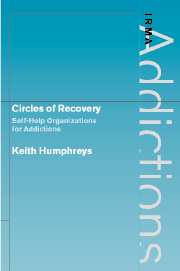Crossref Citations
This Book has been
cited by the following publications. This list is generated based on data provided by Crossref.
EDWARDS, GRIFFITH
2004.
Addiction research: eight researchers offer personal thoughts on the fulfillingness of their careers.
Addiction,
Vol. 99,
Issue. 2,
p.
149.
Moos, Rudolf H.
and
Moos, Bernice S.
2005.
Paths of Entry Into Alcoholics Anonymous: Consequences for Participation and Remission.
Alcoholism: Clinical & Experimental Research,
Vol. 29,
Issue. 10,
p.
1858.
Jackson, Paul
and
Cook, Christopher C. H.
2005.
Introduction of a spirituality group in a community service for people with drinking problems.
Journal of Substance Use,
Vol. 10,
Issue. 6,
p.
375.
McKay, James R.
2006.
Continuing care in the treatment of addictive disorders.
Current Psychiatry Reports,
Vol. 8,
Issue. 5,
p.
355.
Magura, Stephen
2007.
The Relationship Between Substance User Treatment and 12-Step Fellowships: Current Knowledge and Research Questions.
Substance Use & Misuse,
Vol. 42,
Issue. 2-3,
p.
343.
Humphreys, Keith
and
Moos, Rudolf H.
2007.
Encouraging Posttreatment Self-Help Group Involvement to Reduce Demand for Continuing Care Services: Two-Year Clinical and Utilization Outcomes.
Focus,
Vol. 5,
Issue. 2,
p.
193.
Kaskutas, Lee Ann
Ammon, Lyndsay N.
Oberste, Edward
and
Polcin, Douglas L.
2007.
A Brief Scale for Measuring Helping Activities in Recovery: The Brief Helper Therapy Scale.
Substance Use & Misuse,
Vol. 42,
Issue. 11,
p.
1767.
Orford, Jim
Templeton, Lorna
Patel, Asmita
Copello, Alex
and
Velleman, Richard
2007.
The 5-Step family intervention in primary care: I. Strengths and limitations according to family members.
Drugs: Education, Prevention and Policy,
Vol. 14,
Issue. 1,
p.
29.
Borkman, Thomasina
Kaskutas, Lee Ann
and
Owen, Patricia
2007.
Contrasting and Converging Philosophies of Three Models of Alcohol/Other Drugs Treatment.
Alcoholism Treatment Quarterly,
Vol. 25,
Issue. 3,
p.
21.
Kelly, John F.
and
Yeterian, Julie D.
2008.
Mutual-Help Groups for Dually Diagnosed Individuals: Rationale, Description, and Review of the Evidence.
Journal of Groups in Addiction & Recovery,
Vol. 3,
Issue. 3-4,
p.
217.
Laudet, Alexandre B.
2008.
The Road to Recovery: Where Are We Going and How Do We Get There? Empirically Driven Conclusions and Future Directions for Service Development and Research.
Substance Use & Misuse,
Vol. 43,
Issue. 12-13,
p.
2001.
Pain, Karine
and
Cerclé, Alain
2009.
Une étude de Psychologie communautaire : le leadership d'un groupe d'entraide pour malades alcooliques.
Les Cahiers Internationaux de Psychologie Sociale,
Vol. Numéro 84,
Issue. 4,
p.
27.
Kelly, John Francis
Magill, Molly
and
Stout, Robert Lauren
2009.
How do people recover from alcohol dependence? A systematic review of the research on mechanisms of behavior change in Alcoholics Anonymous.
Addiction Research & Theory,
Vol. 17,
Issue. 3,
p.
236.
Weegmann, Martin
and
Piwowoz-Hjort, Ewa
2009.
‘Naught but a story’: Narratives of successful AA recovery.
Health Sociology Review,
Vol. 18,
Issue. 3,
p.
273.
Lembke, Anna
and
Humphreys, Keith
2009.
How to Practice Evidence-Based Psychiatry: Basic Principles and Case Studies.
p.
233.
Timko, Christine
Sutkowi, Anne
and
Moos, Rudolf
2010.
Patients With Dual Diagnoses or Substance Use Disorders Only: 12-Step Group Participation and 1-Year Outcomes.
Substance Use & Misuse,
Vol. 45,
Issue. 4,
p.
613.
Powell, Thomas
and
Perron, Brian Edward
2010.
Self-Help Groups and Mental Health/Substance Use Agencies: The Benefits of Organizational Exchange.
Substance Use & Misuse,
Vol. 45,
Issue. 3,
p.
315.
Kelly, John F.
Kahler, Christopher W.
and
Humphreys, Keith
2010.
Assessing why substance use disorder patients drop out from or refuse to attend 12-step mutual-help groups: The “REASONS” questionnaire.
Addiction Research & Theory,
Vol. 18,
Issue. 3,
p.
316.
Klaw, Elena
and
Luong, Desiree
2010.
The Corsini Encyclopedia of Psychology.
p.
1.
The Alcohol, Drugs and the Family R
Copello, Alex
Ibanga, Akanidomo
Orford, Jim
Templeton, Lorna
and
Velleman, Richard
2010.
The 5-Step Method: Future directions.
Drugs: Education, Prevention and Policy,
Vol. 17,
Issue. sup1,
p.
203.



